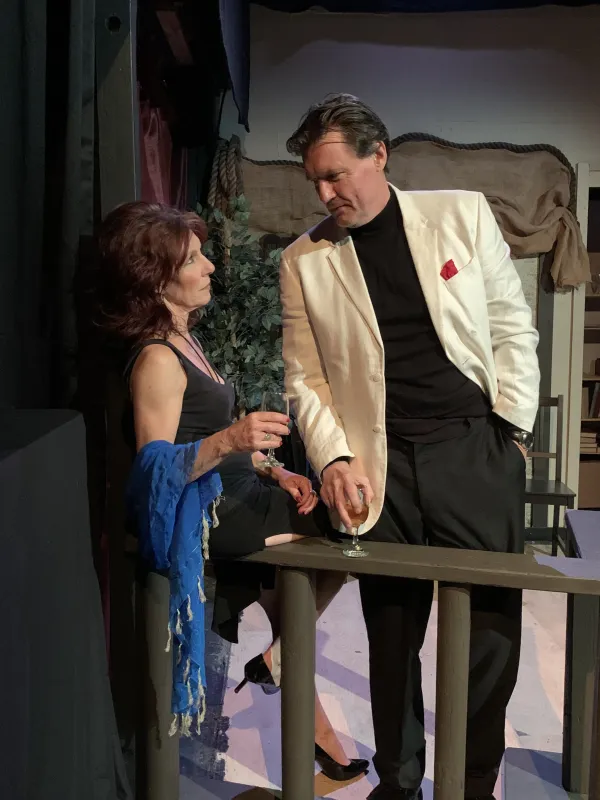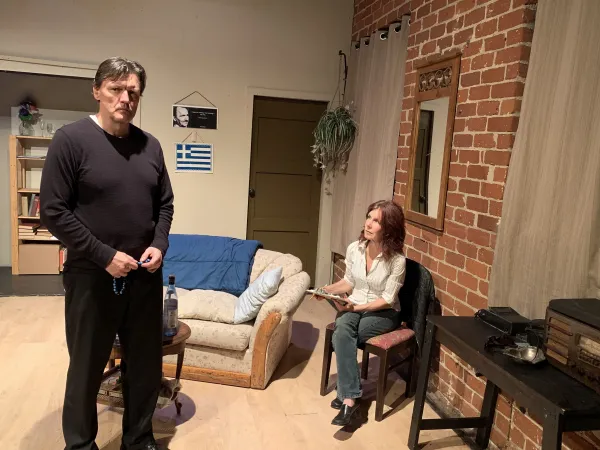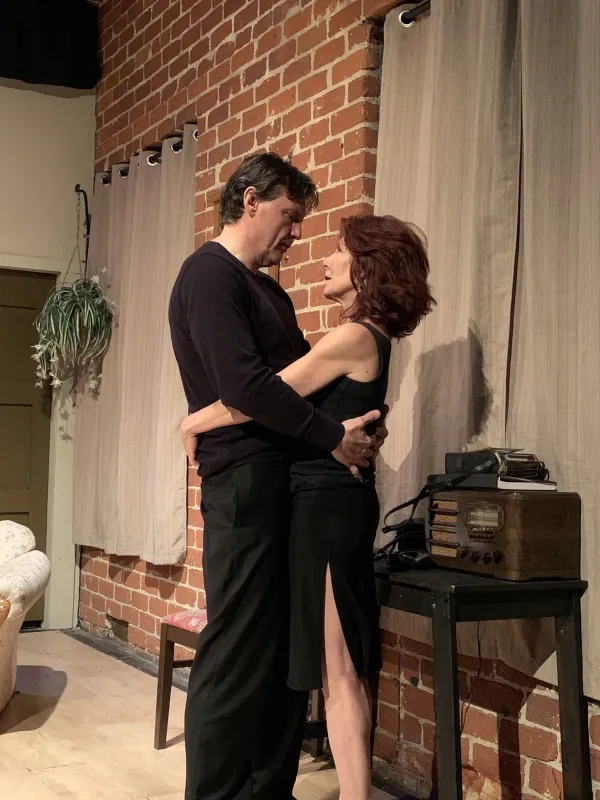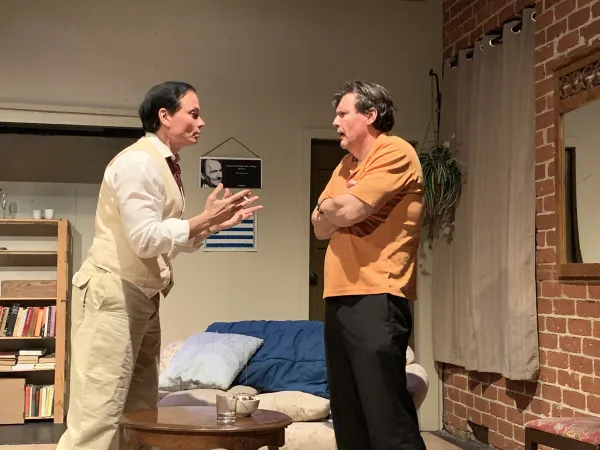What I loved about playwright Willard Manus’ Show Me a Hero is that it introduced me to Greek freedom fighter Alexandros Panagoulis, a significant historical figure I’d never heard of, and brought back to life the legendary journalist Oriana Fallaci, whom I was somewhat familiar with. The UK’s Independent dubbed her “arguably the most extraordinary journalist Italy has ever produced.” The fabled Fallaci (here called Luisa and played with feisty fire by Lisa Robins) joined the Italian anti-Mussolini resistance when she was only 14.
Presumably due to her early participation in the anti-fascist movement when the college dropout became a journalist Fallaci specialized in interviews with controversial political leaders, often revolutionaries like Vietnam’s Giap, Palestine’s Arafat, Libya’s Qaddafi and Cuba’s Fidel. She also interviewed reactionaries, such as mass murderer Henry Kissinger, who later rued their interaction. (Like Jared Kushner and Stephen Miller, Kissinger’s existential angst is that he wanted to be a Nazi - but was born a Jew.)
The only thing about the Florentine that was more controversial than her interviews - calling it “medieval rags” Oriana once ripped her chador off in front of Ayatollah Khomeini - was the contradictory Fallaci herself. I recall that she was rumored to sleep with her interview subjects, which she denied in a 1977 People Magazine interview. But whether or not Oriana danced the horizontal mambo with Castro, one thing’s for sure: She did have a three-year romance with Panagoulis, and their l’amour is the subject of Show Me a Hero.
In this one-act play the political prisoner and a leader of the struggle against Greece’s military junta is called “Petros” and he’s portrayed by Kiev-born Ilia Volok who graduated from the much-vaunted Moscow Art Theatre of Stanislavsky (the man as well as the Method) fame and is an Actors Studio Lifetime Member. Like Robins, Volok’s stage and screen credits outnumber Trump’s lies and director Daniel E. Keogh has much creative clay to mold. The world premiere of Manus’ work dramatizes the driven Luisa’s 1973 flight to Athens to interview Petros, who has just been released from prison, for her magazine (Fallaci did the Q&A for L’Europeo). Sparks immediately flew between the two, and violating a cardinal rule of objective journalism, the highly subjective (and suggestive!) Luisa/Oriana became romantically involved with an interview subject.
The drama follows the ebbs and flows of their passionate relationship. Like many males in patriarchal society, Petros begins to resent the very things that had attracted him to Luisa in the first place, seeking to tame her so the resoundingly independent woman would be at his beck and call. The turbulent romance, of course, is complicated by its being a long distance love affair, as Luisa the war correspondent has to jet off to Vietnam and so on.
Although at times their liaison seems to be one where the only thing more terrible for the partners than being separated is being together, it’s clear that they do love one another. However, Petros has a “mistress” he loves even more than Luisa - namely Greece. After trying to carry out, shall we say, the propaganda of the deed against the tyrannical head of the junta, Georgios Papadopoulos, and experiencing torture and solitary confinement for years, once the Greek colonels are overthrown and a measure of democracy restored to his homeland, Petros continues his crusade. Dedicated to democracy in its birthplace in the West, Petros fights to expose who was behind the 1967 coup that plunged Greece into dictatorship and confronts the powers behind the throne: The U.S. string pullers and a Greek shipping magnate (who may be Aristotle Onassis).
Petros may not be hubristic but his reckless defiance is the stuff Greek tragedies have been made of for thousands of years, as the heroic freedom fighter meets his fate. He’s definitely not one of those compromisers who buys that discretion is the better part of valor.
Despite compelling performances by the impassioned leads, this low budge production in an intimate theater is limited in scope - and perhaps in imagination. To drive home Petros’ heroism one has to be familiar with the Colonels’ coup and the horrors that they perpetrated. Manus is - he reported from Greece for decades, so as a firsthand observer of the junta the ex-journo may take for granted that Yankee Doodle Dandy audiences will be familiar with and care about these crimes against humanity. His play may be called Show Me a Hero, but too often instead of showing the viewers, the characters tell them about the regime’s terrors. Plot points such as torture need to be dramatized in order to engage the audience more fully (although, to be honest, I’m glad they didn’t act out the specific torture Petros suffered that he describes to Luisa).
To deepen the dramatization, a larger cast or projections of film clips, photos and the like might be necessary. But this is easy for me to say, because I’m not paying for it. (The three-hander includes Rico Simonini as Dimitry, Petros’ centrist law partner, which injects a note of homoerotic frisson into the fray.)
The story was evocative for me because while I’d never heard of Panagoulis, when I was 14 my Dad the civil libertarian took me to see the Greek director Costa-Gavras’ immortal classic, Z, which is, hands down, one of the greatest political masterpieces of all time. In this breathtaking tour-de-force Costa unforgettably dramatizes the Colonels’ coup. Financed by the Algerian Revolution, the film is so colossal that Costa was Oscar-nominated for Best Director and Best Writing, Screenplay Based on Material from Another Medium (along with Jorge Semprun), and like this year’s Parasite, it was one of those rare movies to be nommed for both Best Picture and Best Foreign Film. Z won in the latter category, as well as for Best Editing, and because of this cinematic triumph, which I’ve seen a number of times over the years, I was familiar with the backdrop to Show Me a Hero and knew what it meant in English went Luisa proclaimed: “Z!” (If you want to find out what it translates into go see the play for yourself, although here’s a hint: It has nothing to do with Zorro.) (See my interview with Costa at: https://progressive.org/magazine/costa-gavras/.)
In real life Fallaci was a decade older than her Greek lover - she was in her forties, he in his thirties. But this doesn’t enter into the picture of the fictionalized portrait Manus paints (although it is pretty groovy to see more middle-aged lovers depicted). Nor is Panagoulis’ reported abuse that caused Fallaci to lose the baby she was carrying alluded to. By changing the names of his dramatis personae, Manus’ fictionalization is a convenient plot device that enables his play to sidestep unpleasant facts and take poetic license.
Manus often dramatizes the lives of famous people, but Show Me a Hero is of a piece with his last production, which was also mounted at the Brickhouse Theatre. Their Finest Hour - Churchill and Murrow is another play about politics and journalism in general, and in particular about my namesake Edward R. Murrow, who like Fallaci/Luisa, used journalism as a tool against oppression. I learned a lot from Show Me and enjoyed Volok’s Zorba-like Greek dancing (recorded music supervision and choreo by Dalia Miller, not Anthony Quinn). This play deserves to be expanded into a motion picture, like Manus’ recent Frank and Ava, about the romance between Sinatra and Ava Gardner, has been.
In any case, Show Me has intrigued me and whetted my appetite. Thanks to this work I want to read Fallaci’s interviews plus her 1981 novel Un uomo about Panagoulis and the epic struggle to return democracy to the place where it was born in the Western world.
Show Me a Hero plays Saturdays at 8:00 p.m. and Sundays at 3:00 p.m. through March 29 at Write Act Repertory @ the Brickhouse Theatre, 10950 Peach Grove Street, North Hollywood, CA 91601. Info: (800)838-3006 (ext. 1); www.Brownpapertickets.com/event/4510530.
For those who value excellence and diversity on the stage, The Los Angeles Women's Theatre Festival’s 27th annual fête, focusing on multi-culti female solo performers, is taking place March 26 - 29 at Theatre 68, 5112 Lankershim Boulevard, North Hollywood, CA 91601. See: https://www.lawtf.org/.
Ed Rampell is an L.A.-based reviewer who recently won a theatre critic award: https://better-lemons.com/the-better-lemons-fomenter-of-revolution-critic-award-for-2019-goes-to/. The third edition of “The Hawaii Movie and Television Book”, co-authored by Rampell, is available at: https://mutualpublishing.com/product/the-hawaii-movie-and-television-book/ . For info about the upcoming 70th anniversary commemoration of the imprisonment of Dalton Trumbo and the Hollywood Ten see: https://www.gofundme.com/f/hollywood-blacklist-70th-anniversary-cinema-series.






